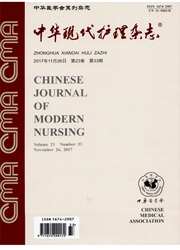

 中文摘要:
中文摘要:
目的 探讨积极心理护理干预对强直性脊柱炎患者负性情绪及睡眠质量的影响,为临床护理提供依据.方法 采用随机抽样法于2015年4月-2016年10月在南京大学医学院附属鼓楼医院脊柱外科患者88例,用随机数字法将强直性脊柱炎患者随机分为试验组和对照组各44例,对照组实施常规护理,试验组在常规护理的基础上实施积极心理护理干预,应用焦虑自评量表(SAS)、抑郁自评量表(SDS)、匹兹堡睡眠质量表(PSQI)和满意度调查表评价积极心理护理干预前后的效果.结果 干预后试验组患者焦虑自评量表、抑郁自评量表评分为(36.27〈3.86)、(34.37〈5.02)分,均低于干预前(P〈0.05).试验组PSQI评分为(7.6〈2.4)分,低于对照组(P〈0.05),干预后试验组护理满意度评分为95.45%,高于对照组的79.54%.结论 积极心理护理干预能够减轻强直性脊柱炎患者焦虑抑郁状况,有效缓解患者的负性情绪,改善睡眠质量和护理满意度.
 英文摘要:
英文摘要:
Objective To explore the effect of positive psychological nursing intervention on the negative emotions and sleep quality of patients with ankylosing spondylitis (AS), and to provide a basis for clinical nursing.Methods Totally 88 patients from the Department of Spinal Surgery of Nanjing Drum Tower Hospital, the Affiliated Hospital of Nanjing University Medical School between April 2015 and October 2016 were selected by random sampling and equally divided into a treatment group and a control group according to the table of random number. The patients in the control group received conventional nursing, while the patients in the treatment group, on this basis, received positive psychological nursing intervention. The effect was evaluated with Self-Rating Anxiety Scale (SAS), Self-Rating Depression Scale (SDS), Pittsburgh Sleep Quality Index (PSQI) and Satisfaction Questionnaire before and after the intervention.ResultsAfter the intervention, the patients in the treatment group showed lower SAS and SDS scores than before the intervention (P〈0.05), which were(36.27〈3.86) and (34.37〈5.02), respectively. The PSQI score of the patients in the treatment group was (7.6〈2.4), lower than that of the patients in the control group (P〈0.05). The patients in the treatment group had a higher satisfaction score (95.45%) than the patients in the control group (79.54%). ConclusionsPositive psychological nursing intervention can effectively reduce anxiety and depression in AS patients, relieve their negative emotions, and improve their sleep quality and nursing satisfaction.
 同期刊论文项目
同期刊论文项目
 同项目期刊论文
同项目期刊论文
 期刊信息
期刊信息
